Zendesk is well known for its customizable interface and collection of apps and integrations. This highly usable customer service platform can definitely meet a range of business needs.
However, Zendesk comes with a relatively high price, even for their most basic packages.
Fortunately, the marketplace for cloud-based customer relationship management platforms is both diverse and competitive.
That’s why we’ve done the research and found 18 excellent Zendesk alternatives.
Let’s jump into the in-depth reviews.
Let’s start with the most important question—
Why look for a Zendesk alternative?
According to the source itself, Zendesk serves more than 100,000 customers across a multitude of industries in over 30 languages. Their clients are mainly small businesses with B2B transactional models.
So, what can be the reason for companies looking for an alternative?
Here are just a few:
- Complicated system—the onboarding is complex, and it can be confusing to differentiate between triggers and time-based automation
- Limited customer support—some users say they’ve experienced subpar customer support with difficult-to-reach human agents for in-app challenges or guidance
- Pricing—the system operates on a subscription model that is unaffordable for small businesses for the full range of features
Don’t worry—
We went on a mission to find some top customer service software providers according to product features, support, integrations and deployment, and pricing.
18 best Zendesk alternatives
Here are in-depth reviews of top Zendesk competitors:
1. Tidio
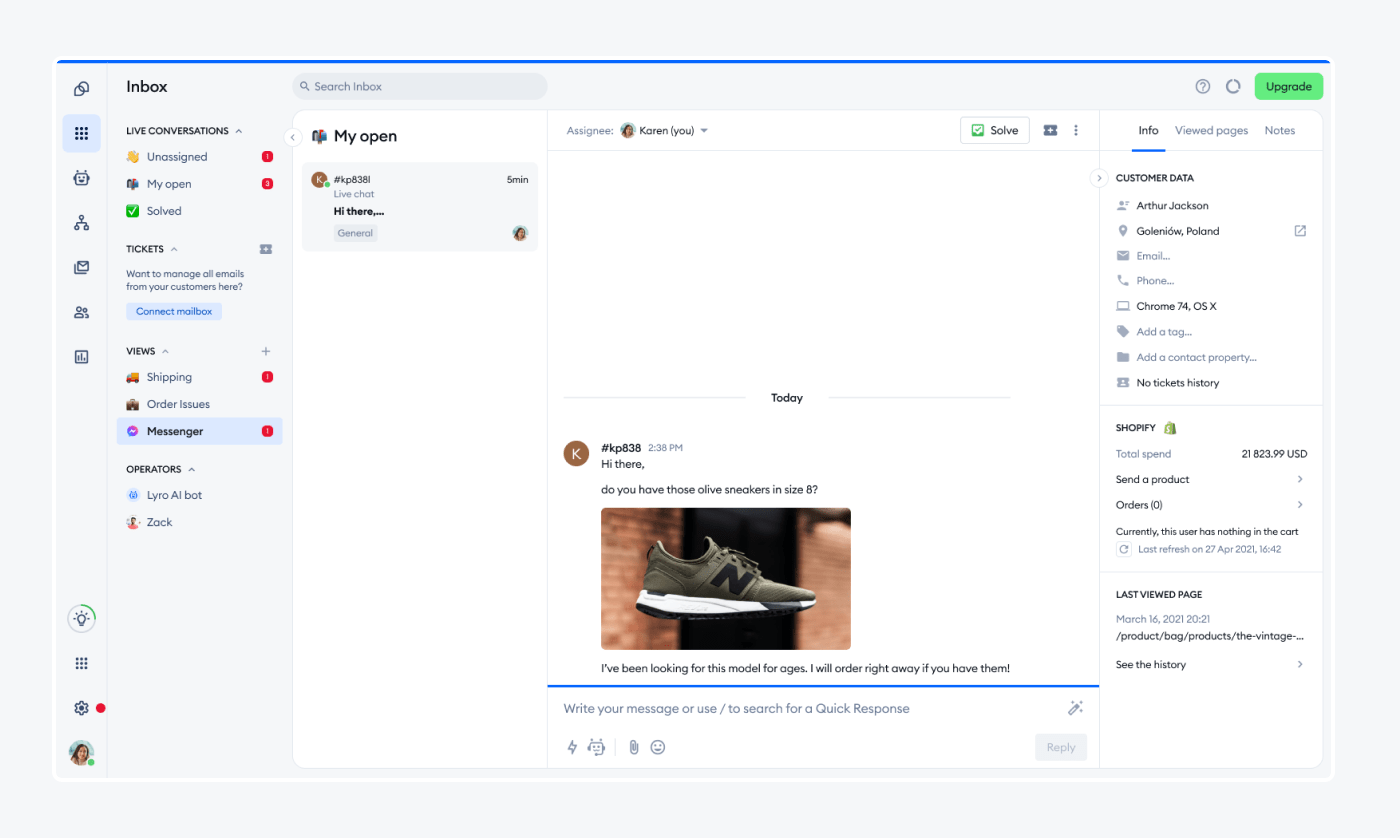
Ratings: 4.7/5 ⭐️ (1,440+ reviews)
Best for: small to medium businesses
Tidio is an all-encompassing customer experience tool that companies use on their websites for real-time conversations. Its service is known for its simplicity, but it provides much more than a simple web chat feature. Tidio also offers conversational AI chatbots, a shared inbox, email marketing system, and analytics dashboards.
What Tidio ultimately offers is a less costly alternative to Zendesk and other competitors. If you’re curious about how Tidio can help your business, you can install Tidio on your website in a few minutes, for free.
Key features:
- Conversational AI, Lyro
- Ticketing system
- Help desk automations
- Over 120 integrations
- Android and iOS apps
- 7-day free trial available
- Free version available
- Starter ($29/mo)
- Growth (starts at $59/mo)
- Plus (starts at $749/mo)
- Premium (starts at $2999/mo)
Discover how Tidio can help you grow your business
Read more: Learn how to easily install Tidio on your website.
2. HelpCrunch
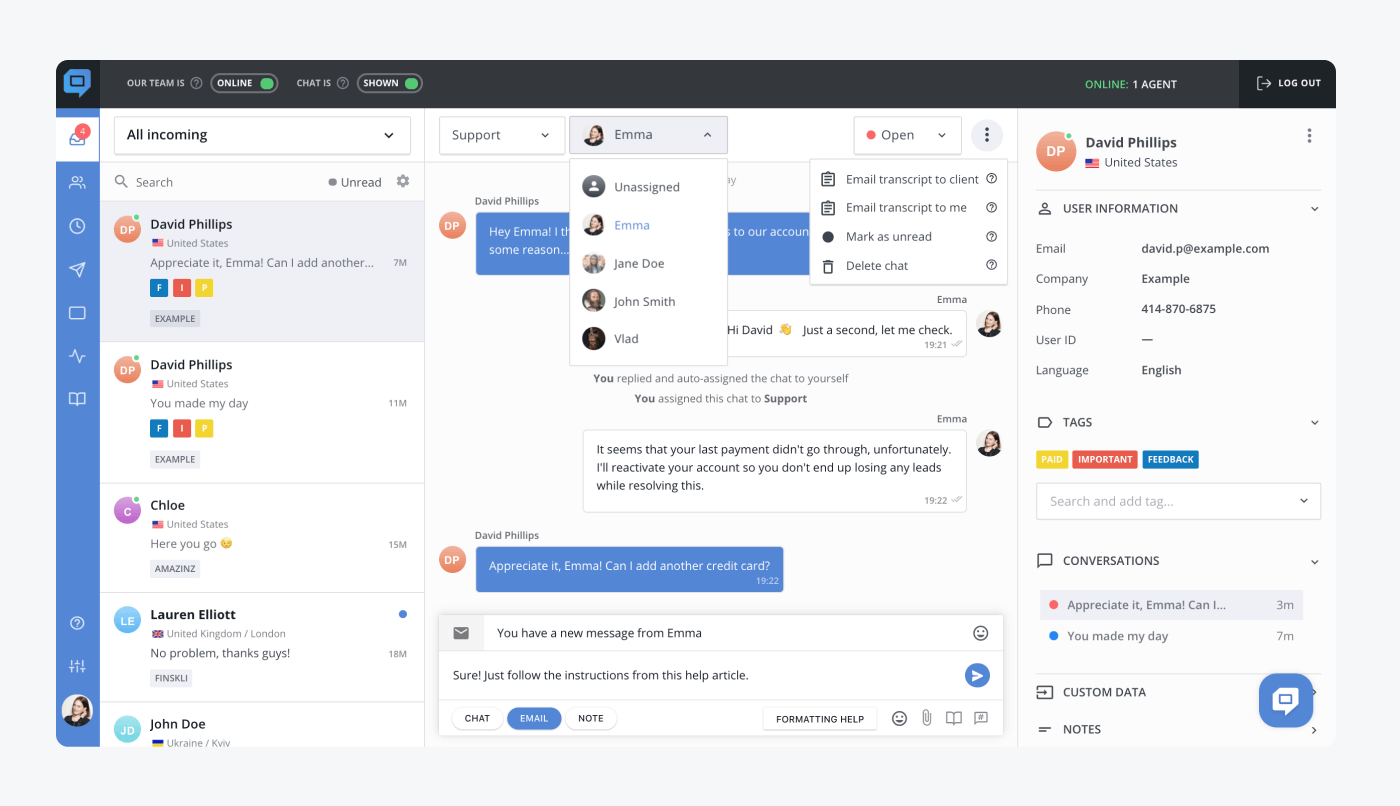
Ratings: 4.7/5 ⭐️ (200+ reviews)
Best for: SaaS companies
HelpCrunch is another highly-rated Zendesk alternative with a focus on marketing and sales. This help desk solution helps you solve customer issues and improve your conversions using a CRM, live chat, and messaging.
HelpCrunch stands out as one of the best Zendesk competitors thanks to its focus on modern online marketing practices. On top of that, the software includes automatic messaging, email marketing, and customer engagement tools.
Pros:
- Advanced help desk management
- Service level agreement management
- Extensive knowledge base
Cons:
- No free version (just a short free trial)
- Users complain that the mobile app can be slow
- Free 14-day trial available
- Basic ($15/mo/user)
- Pro ($25/mo/user)
- Unlimited ($620/mo/user)
3. Intercom
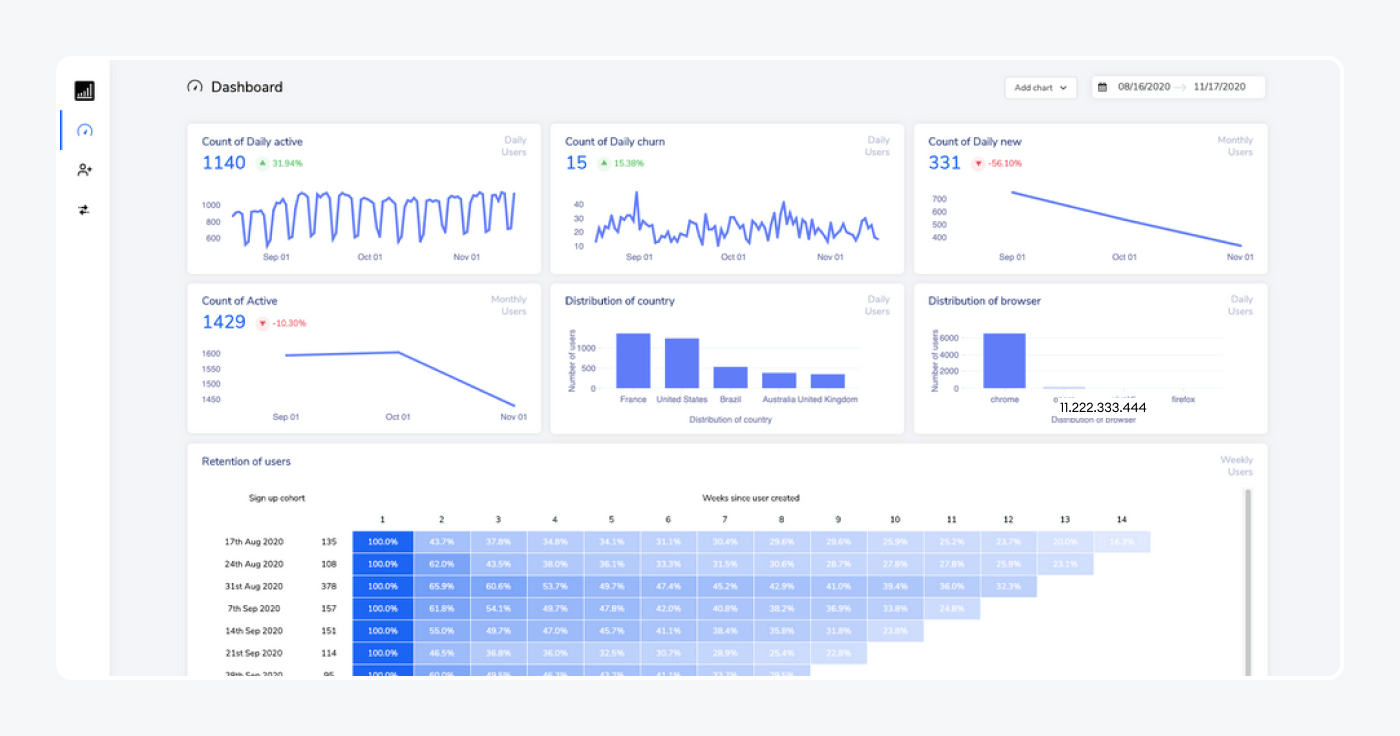
Ratings: 4.5/5 ⭐️ (2,900+)
Best for: enterprise businesses
Intercom is a Zendesk alternative with a fairly simple package and unique features. One way Intercom stands out is by adding rules to your funnel which contributes to workflow automation. For example, you can manually set the rules for chatbot builders and automatically sort visitors into categories, which can help to streamline communication in the future.
While these features are more difficult to apply than with the other Intercom alternatives, Intercom offers a lot of customization and flexibility.
Pros:
- Highly customizable
- Automated help desk
- Collision detection for support requests
Cons:
- On the more expensive side, not ideal for small businesses or startups
- Steep learning curve
- Free 14-day trial available
- Essential ($39/mo/seat)
- Advanced ($99/mo/seat)
- Expert ($139/mo/seat)
Read more: Check out the main differences between Zendesk to Intercom decide which tool is better for your business needs.
4. Olark
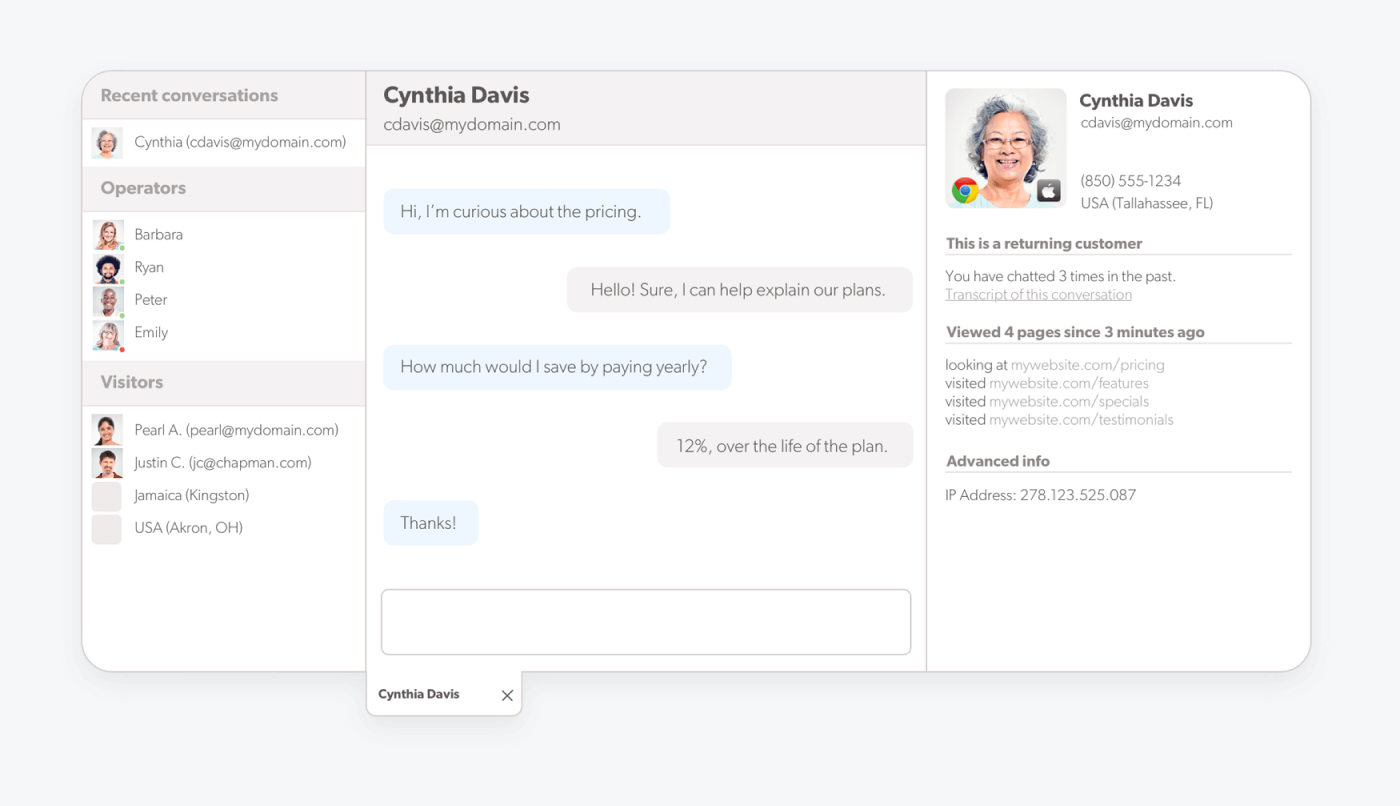
Ratings: 4.3/5 ⭐️ (200+ reviews)
Best for: small customer support teams
Olark is another Zendesk alternative that focuses on direct solutions to problems as they pop up. This support tool is among the most popular when it comes to live chat, and it claims to serve over 12,000 businesses worldwide.
In terms of service, Olark offers a lot of customization. It focuses on the small touches that make the interfaces more relatable to your audience. Moreover, it provides a human-centered approach putting the user experience first and foremost.
Pros:
- Chat routing for support agents
- Extremely intuitive interface
- Multiple add-ons and integrations
Cons:
- Not as feature-rich as most alternatives
- Screen sharing for live chat has problems
- Free 14-day trial available
- Live chat ($29/mo/seat)
5. Drift
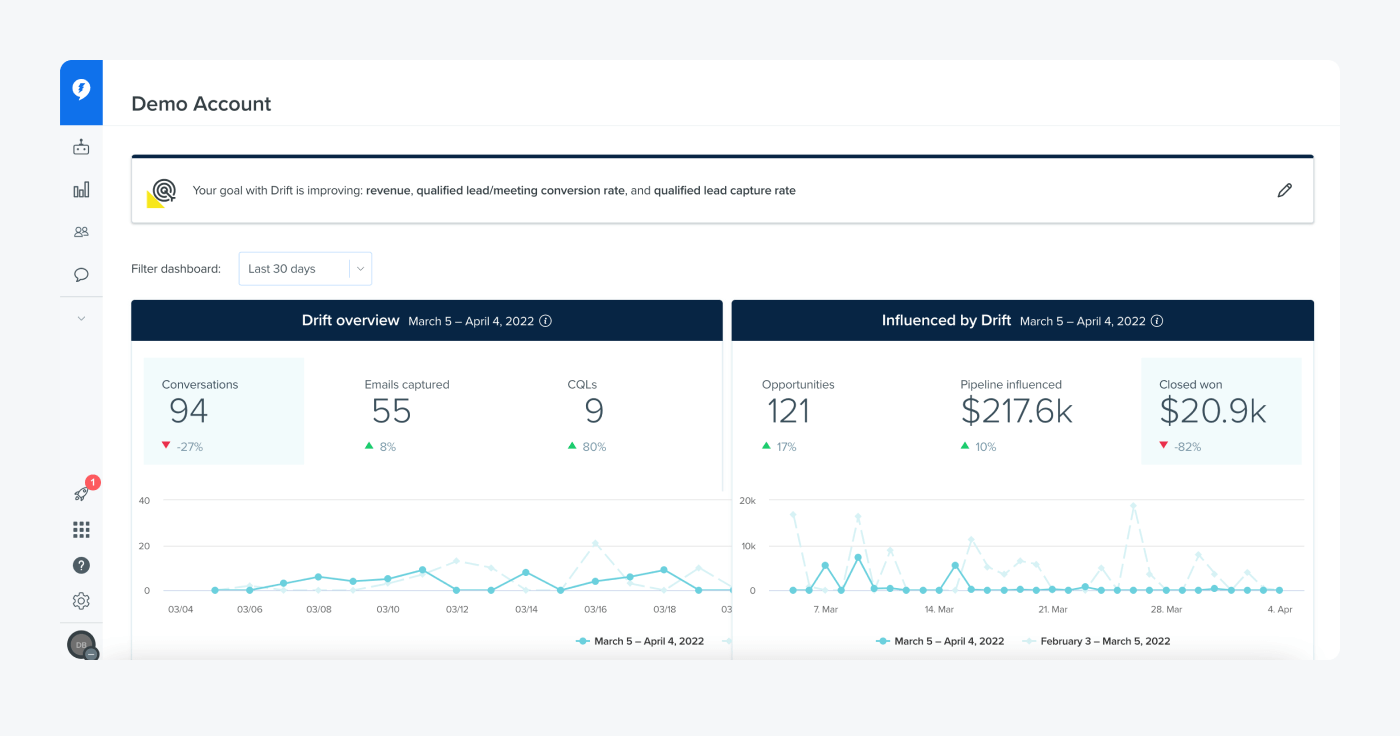
Ratings: 4.4/5 ⭐️ (1,150+ reviews)
Best for: bigger companies
Drift is a cloud-based solution that helps to automate sales processes. This Zendesk alternative stands out for its customer loyalty focus and some small touches that save its clients from several typical frustrations.
Drift offers a chatbot and features like an offline self-service portal and geotargeting, which makes the sales process seamless.
Pros:
- Highly customizable
- Marketing reporting features
- Multiple insider forums
Cons:
- Only available in English
- Expensive premium packages
- Premium ($2,500/mo)
- Advanced → contact sales team
- Enterprise → contact sales team
6. Front
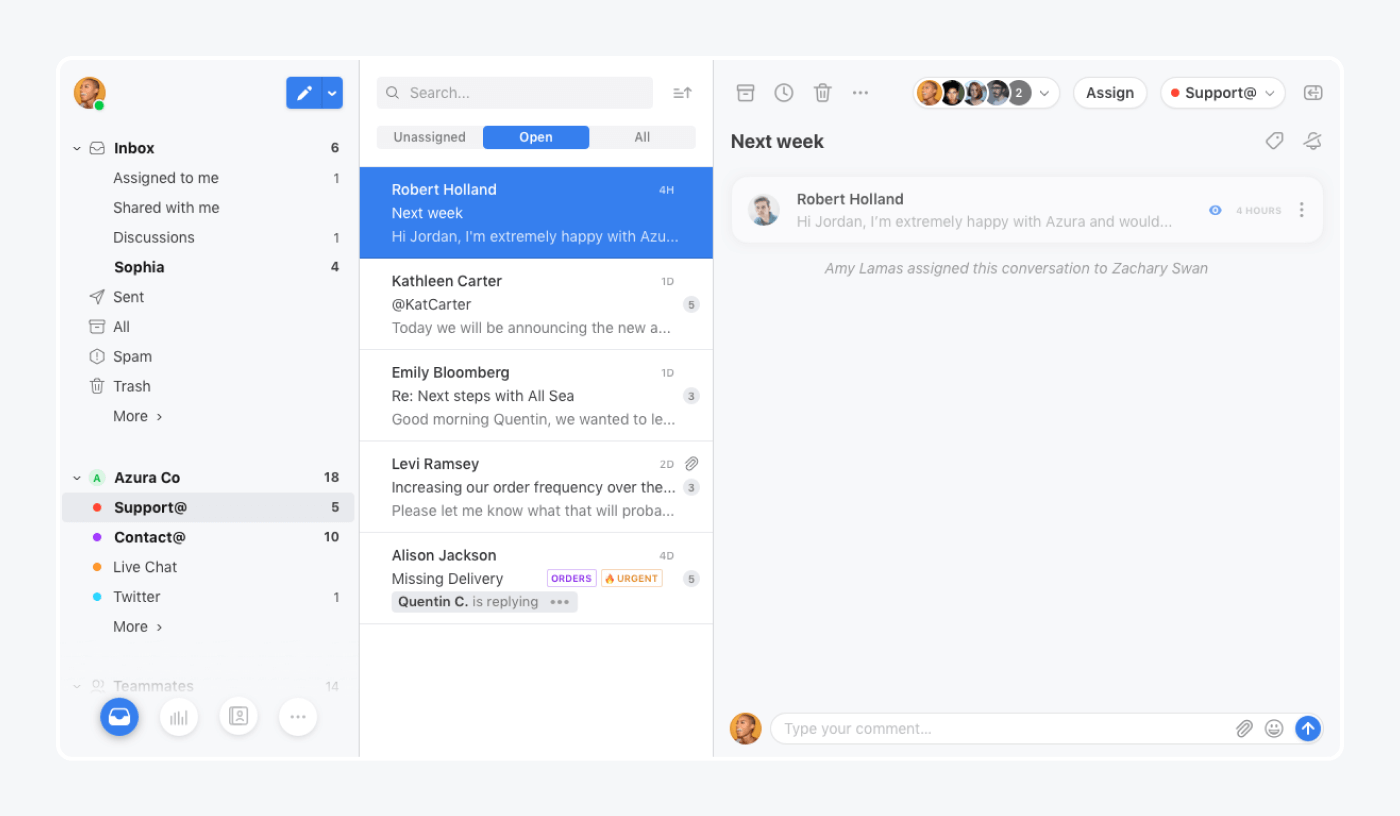
Ratings: 4.7/5 ⭐️ (2,060+ reviews)
Best for: ecommerce and online marketplaces like Shopify, Lyft, Airbnb, etc.
Front is a more user-friendly alternative to Zendesk. It employs conventional ticketing software that ensures quicker response times and a more personal touch during customer interactions.
The platform can be used via mobile or desktop apps and includes the CRM features you’re accustomed to. Moreover, this system places a much higher emphasis on email than its competition.
Pros:
- Extensive training resources
- Remote team collaboration
- API customization
Cons:
- Customer support is not easily accessible
- Technical issues with their Android app
- Starter ($19/mo/seat)
- Growth ($59/mo/seat)
- Scale ($99/mo/seat)
- Premier ($299/mo/seat)
7. HubSpot
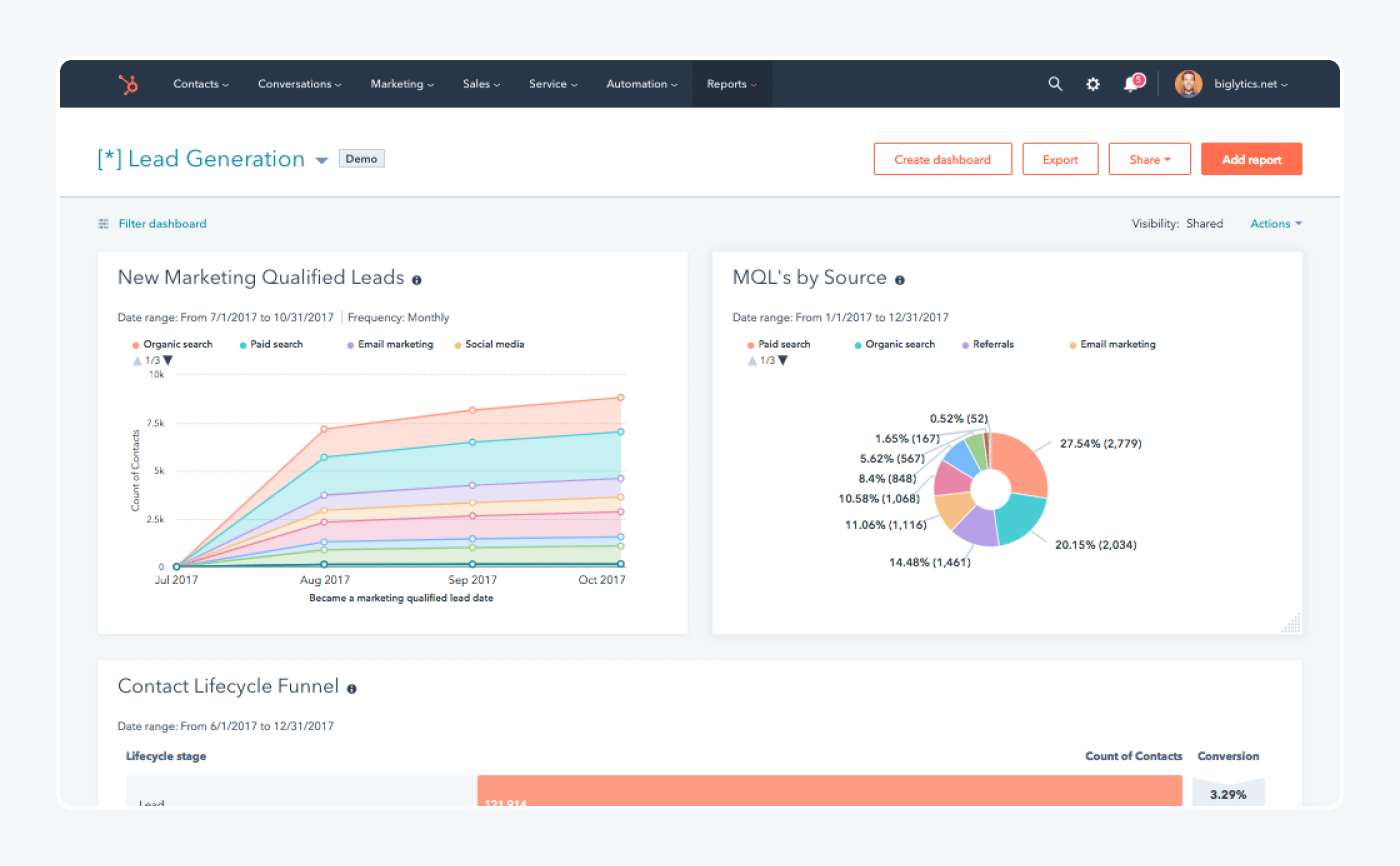
Ratings: 4.4/5 ⭐️ (2,200+ reviews)
Best for: organizations looking for an all-in-one CRM hub
HubSpot service hub is well known for its collection of inbound marketing and sales tools. But it’s also a simple yet comprehensive powerhouse in the industry.
As an alternative to Zendesk, this platform is highly feature-rich and offers a great array of integrations. On top of that, the free and paid plans are very diverse, making them a good option for businesses of any size.
Pros:
- Over 1000 third-party integrations
- Simple, easy-to-use interfaces
- User permissions for team members
Cons:
- Paid plans are relatively expensive
- Decent customer support with the free plan is lacking
- Free version available
- Starter ($20/mo/seat)
- Professional Customer Platform ($1,180/mo)
- Enterprise Customer Platform ($3,910/mo)
Read more: Check out the top HubSpot alternatives with pros, cons, and pricing compared. Also, learn the core differences between Help Scout vs. Zendesk. Also, be sure to explore the differences between Zendesk vs. HubSpot.
8. Salesforce Pardot
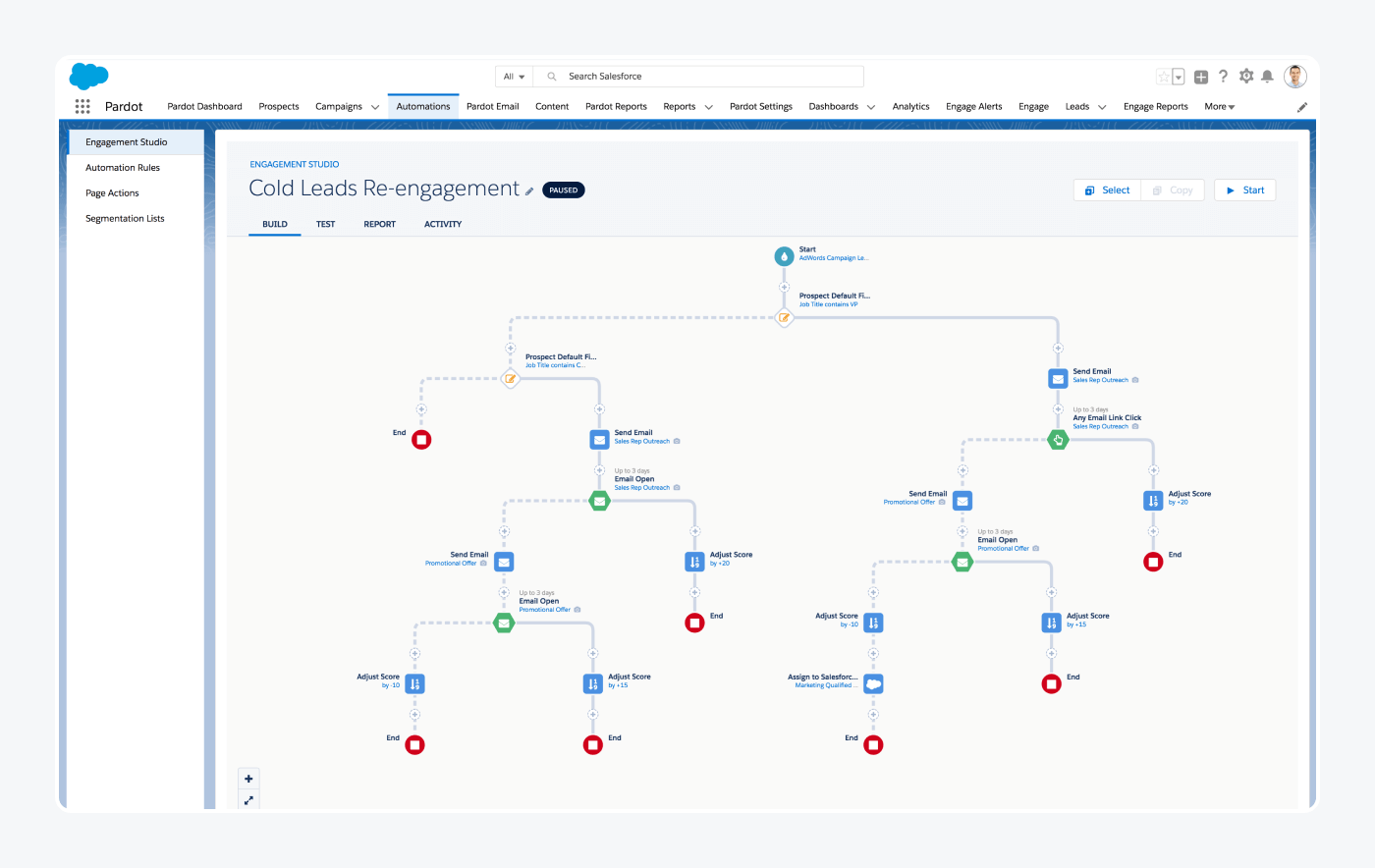
Ratings: 4/5 ⭐️ (2,270+ reviews)
Best for: B2B companies
Unlike most of the Zendesk alternatives we’ve covered, Pardot focuses specifically on the needs of B2B businesses. It offers many of the same features as Zendesk, but is more intuitive. However, as a B2B CRM, it’s a particularly comprehensive and expensive option.
Pros:
- Lead nurturing and qualification
- A/B testing of templates and emails
- Advanced analytical tools for most functions
Cons:
- The best features require expensive subscriptions
- No built-in CMS
- Growth ($1,250/mo)
- Plus ($2,750/mo)
- Advanced ($4,400/mo)
- Premium ($15,000/mo)
Read more: Check out the detailed comparison of Zendesk vs. Salesforce to learn all the differences between the two platforms
9. LiveChat
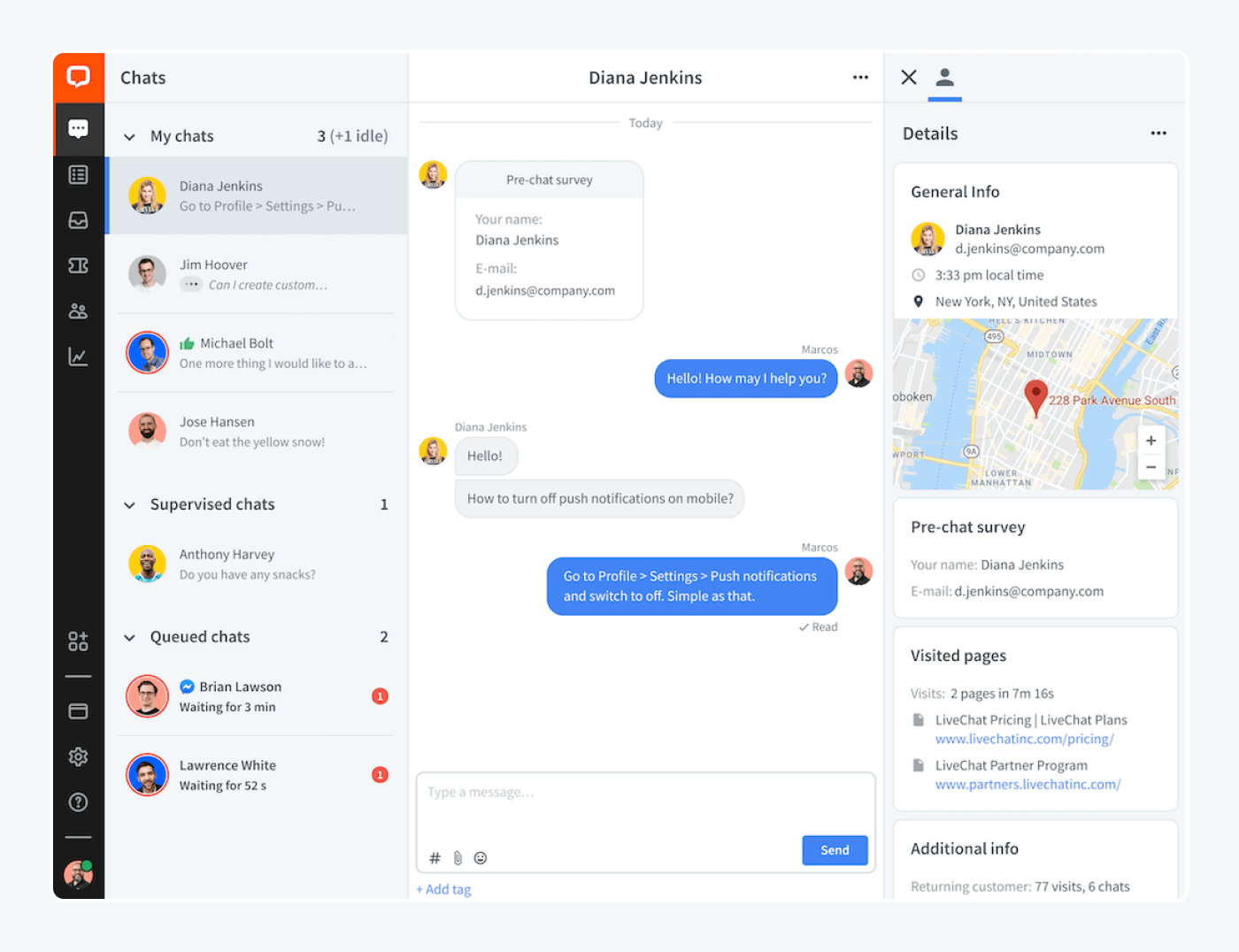
Ratings: 4.5/5 ⭐️ (700+ reviews)
Best for: SMB clients
LiveChat has the most self-explanatory name of any software products we’ve covered so far. They offer a live chat platform that’s integrated into your website, aimed at improving the overall customer experience.
As one of the Zendesk chat alternatives, LiveChat offers features like alerts for ticket escalation, geotargeting, and email response control. Where LiveChat stands out is in its many third-party integrations, filtering, proactive chat software, and rerouting capacities.
Pros:
- Dedicated customer portal available
- Over 200 integrations including Zapier, Facebook, etc.
- Time tracking feature for performance measurement
Cons:
- A bit pricey even for the simple services offered
- Some customers complain about ineffective spam filters
- Free 14-day trial available
- Starter ($20/mo/person)
- Team ($41/mo/person)
- Business ($59/mo/person)
- Enterprise → contact sales team
10. Gorgias
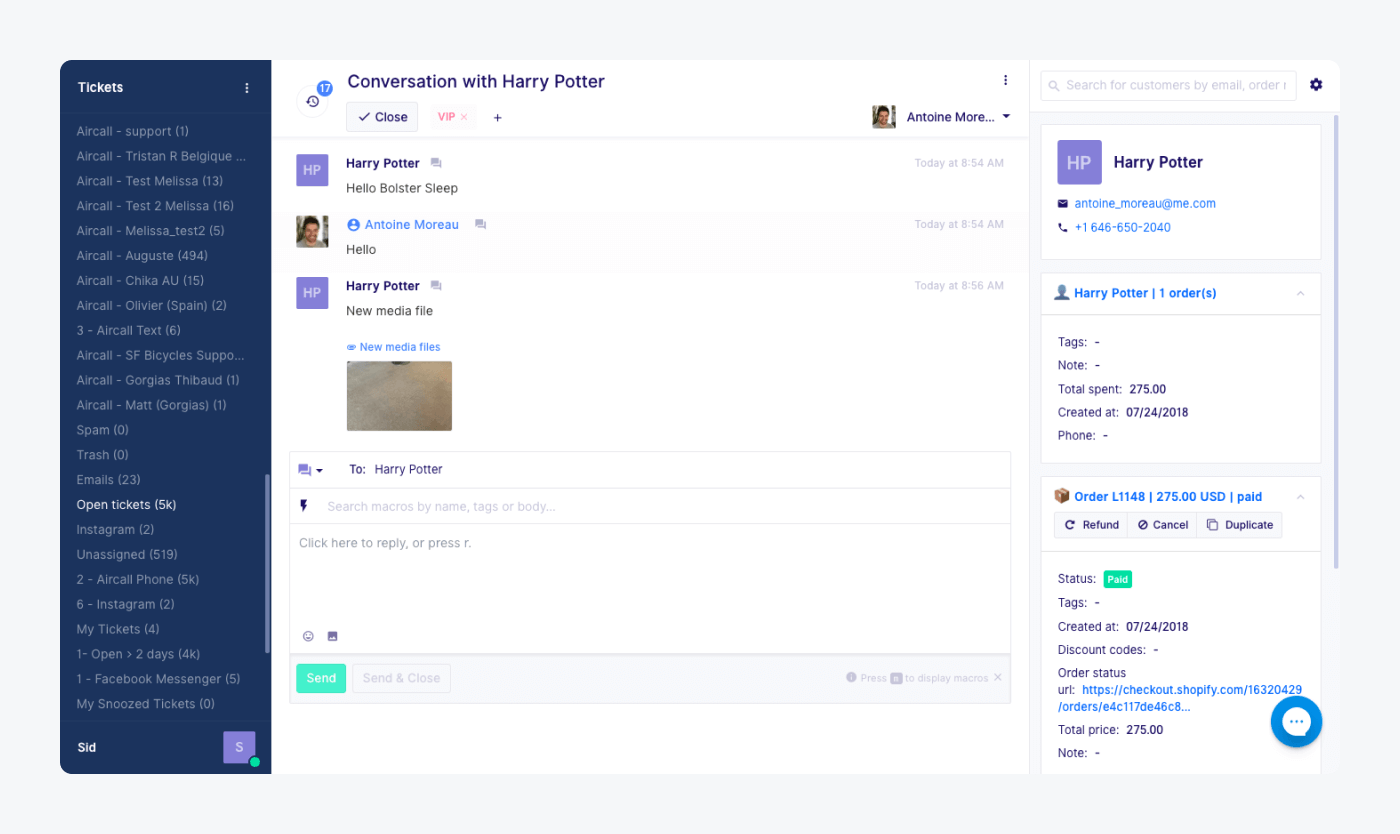
Ratings: 4.6/5⭐️ (500+ reviews)
Best for: ecommerce businesses
Gorgias is a Zendesk alternative that has given itself a rather focused mission: supporting ecommerce businesses. They specialize in this one area of customer relationship management.
Gorgias is rated as one of the best Shopify live chat apps, but also integrates with BigCommerce and Magento. Other typical features include multichannel communication, loyalty plans, and customer feedback based on user sentiment analysis.
Pros:
- Cloud-based, convenient service
- Minimalistic interface
- Multichannel communication
Cons:
- Some customers complain about ticketing system glitches
- High minimum costs
- Free trial available
- Starter ($10/mo/50 tickets)
- Basic ($60/mo/300 tickets)
- Pro ($360/mo/2,000 tickets)
- Advanced ($900/mo/5,000 tickets)
- Enterprise → contact sales team
Read more: Discover the top Gorgias alternatives and pick the right one for your business. Also, be sure to explore the comparison between Gorgias vs. Zendesk.
11. Freshdesk
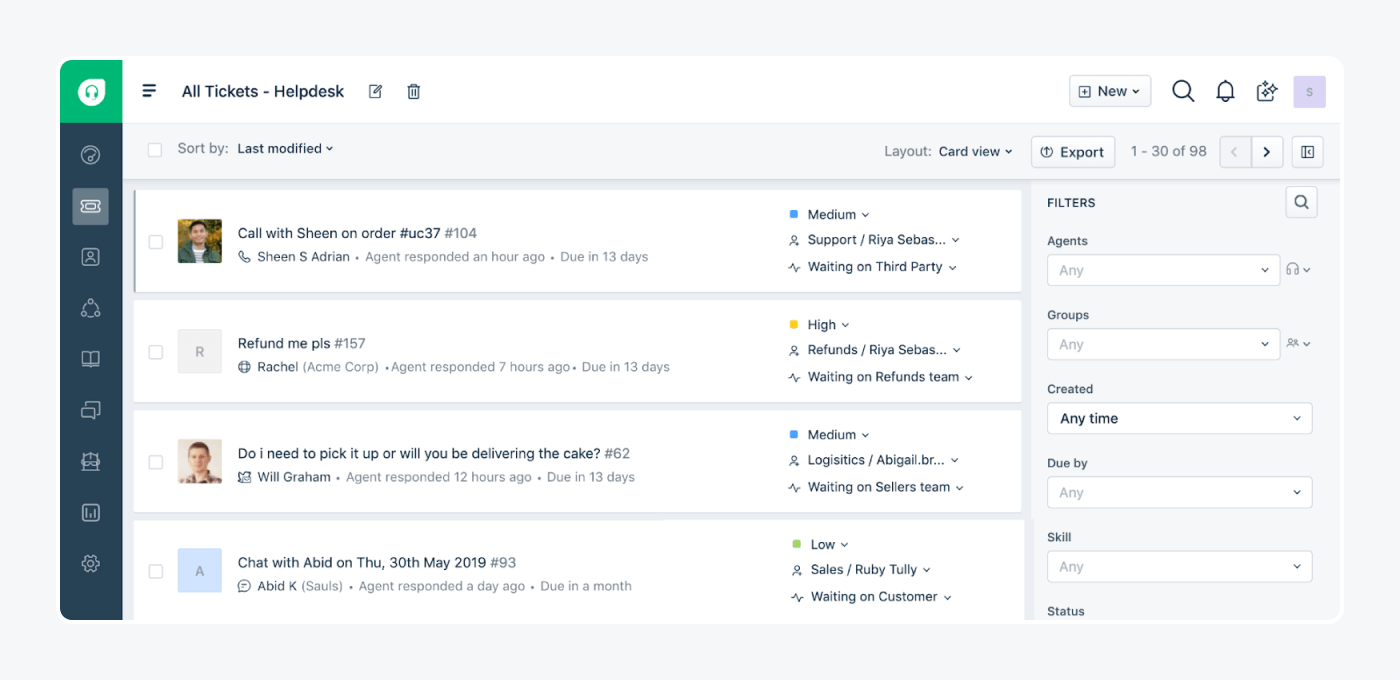
Ratings: 4.4/5 ⭐️ (3,100+ reviews)
Best for: enterprise companies
Freshdesk is a customer support software, known for its scalable AI ticketing system. This Zendesk free alternative provides an omnichannel support platform with an IT service desk and a CRM solution.
Through its unified workspace, team members can collaborate on support tickets. Agents can prioritize customer requests and respond to them based on the level of urgency. On top of that, managers can automate self-service using the system’s external knowledge base and custom widgets to shorten the response time.
Pros:
- Canned replies for live chat
- AI automation capabilities
- Custom APIs available
Cons:
- Occasional execution delays
- Customization problems
- Free version available
- Growth ($18/mo/agent)
- Pro ($59/mo/agent)
- Enterprise ($95/mo/agent)
Read more: Learn what the best Freshdesk alternatives are with pros, cons, and pricing compared.
12. Zoho desk
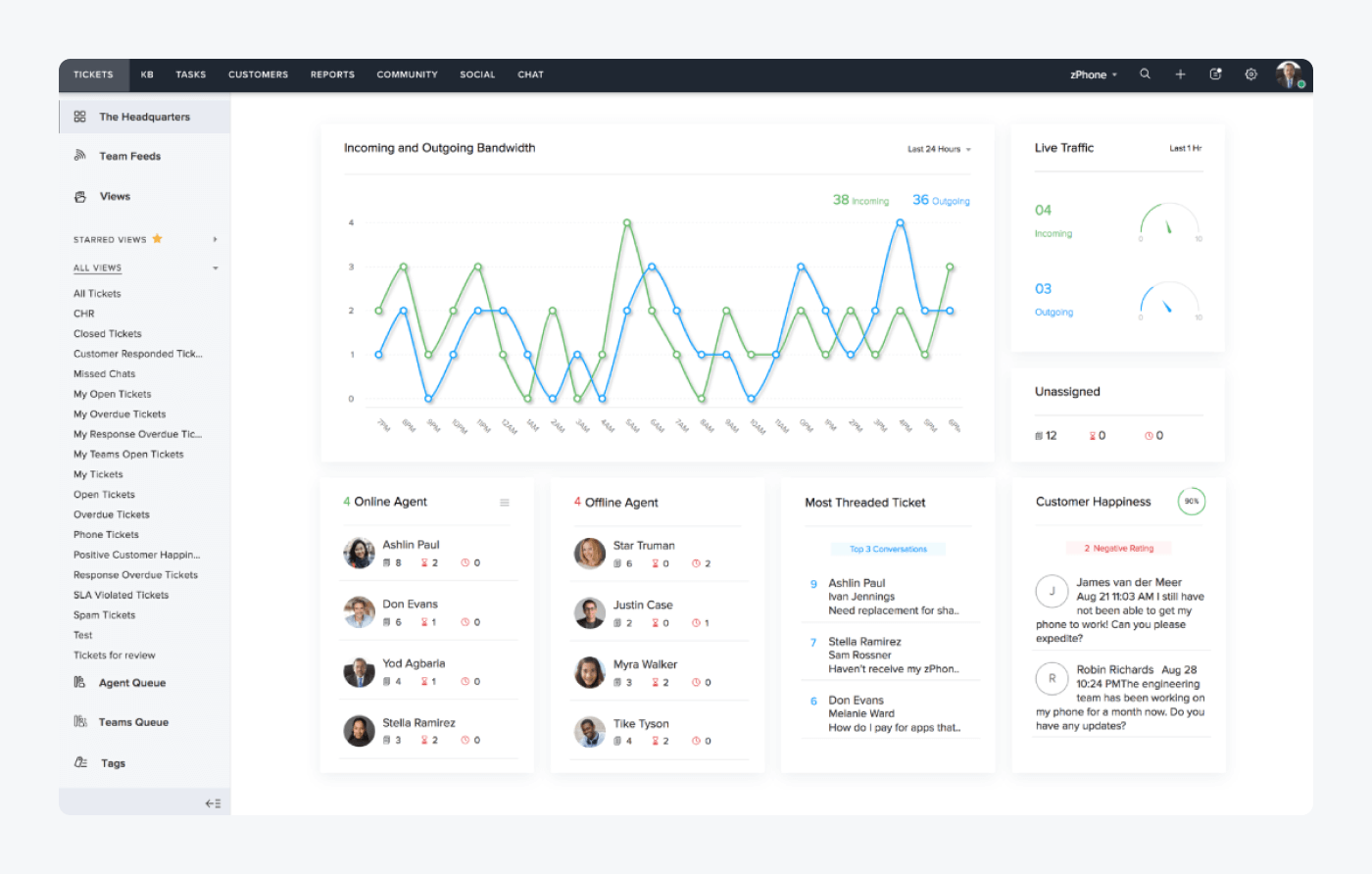
Ratings: 4.4/5⭐️ (5,400+ reviews)
Best for: SaaS businesses
Zoho Desk is a customer complaint management software that helps your business become more accessible to consumers. It empowers agents with powerful customer support tools to improve organization and productivity within the team. Moreover, managers can keep track of actionable support metrics, and understand their audience needs better.
This Zendesk chat alternative has an easy-to-use ticketing system that streamlines support. The system can route all requests to and from its omnichannel platform. And, the AI-powered assistant can identify sentiments behind each ticket to pull up appropriate responses from the knowledge base articles.
Pros:
- Ticket management system
- SLAs and workflow automation
- Multi-brand help center
Cons:
- Cluttered user interface
- Faulty email integration
- Free 15-day trial available
- Standard ($20/mo/user)
- Professional ($35/mo/user)
- Enterprise ($50/mo/user)
13. Hiver
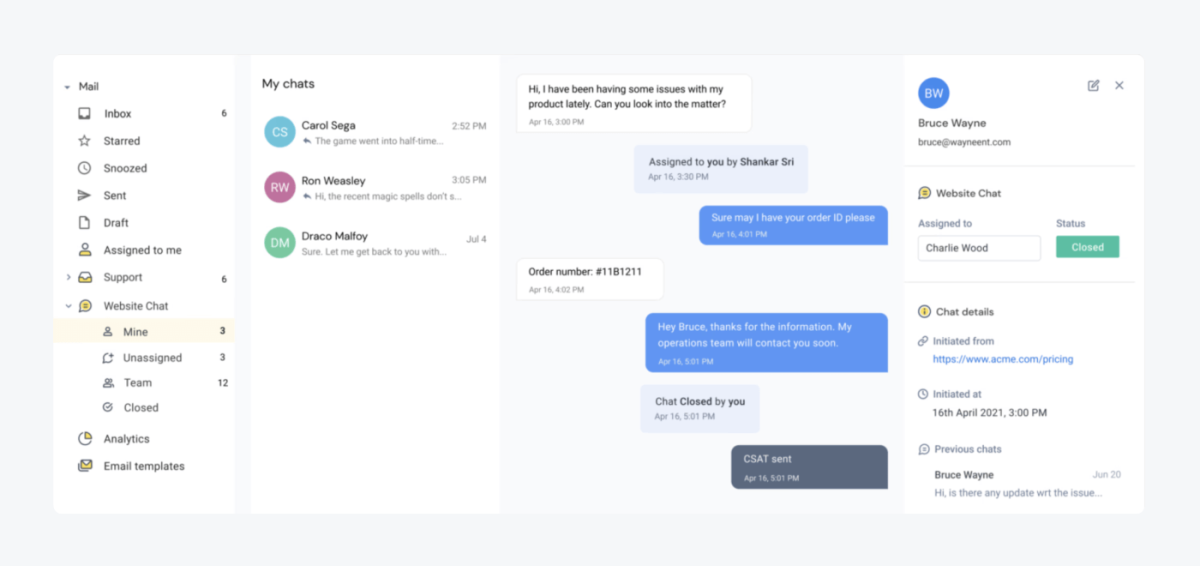
Ratings: 4.6/5 ⭐️ (1,020+ reviews)
Best for: small businesses with small support teams
Hiver is a shared inbox tool for small teams to collaborate on support requests. It operates on the Gmail interface and extends help desk functionality to the email clients. The software enables agents to manage all customer conversations from the team inbox.
This Zendesk alternative allows agents to delegate incoming customer inquiries through a single click and add notes to conversation threads for easier cooperation. Managers can track key metrics and agent performance using the unified tool.
Pros:
- Multichannel platform
- Ready-to-use email templates
- Help desk analytics and metrics
Cons:
- Limited to Gmail
- Configuration problems
- Free 7-day trial available
- Lite ($19/mo/user)
- Pro ($59/mo/user)
- Elite ($99/mo/user)
Read more: Discover the best Hiver alternatives available on the market today.
14. HelpScout
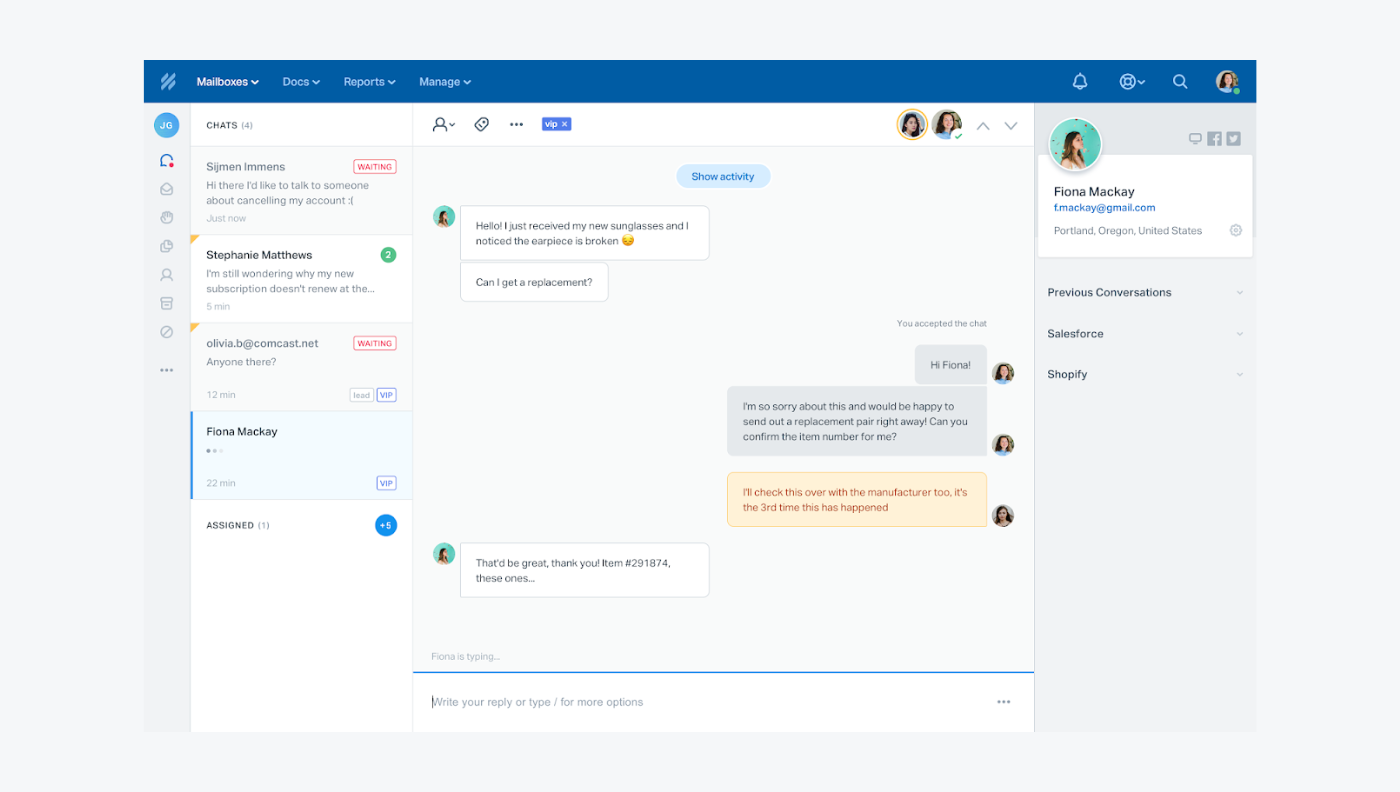
Ratings: 4.4/5 ⭐️ (400+ reviews)
Best for: small businesses
HelpScout is a customer support platform that brings all client communications under one umbrella. This Zendesk competitor offers a shared inbox for agents to work together on requests. It also has a help center for consumers seeking support.
Agents can use the AI feature to handle repetitive tasks, generate article drafts, summarize threads, and improve response time. Also, the platform provides API and SDKs for admins to customize integrations to external tools.
Pros:
- Advanced live chat functionality
- Over 50 integrations
- Automated workflows
Cons:
- Limited in-depth metrics and statistics
- Few knowledge base customization options
- Free 15-day trial available
- Standard ($25/mo/user)
- Plus ($50/mo/user)
- Pro (Contact sales team)
Read more: Check out the top HelpScout alternatives and choose the best one for your business.
15. Kustomer
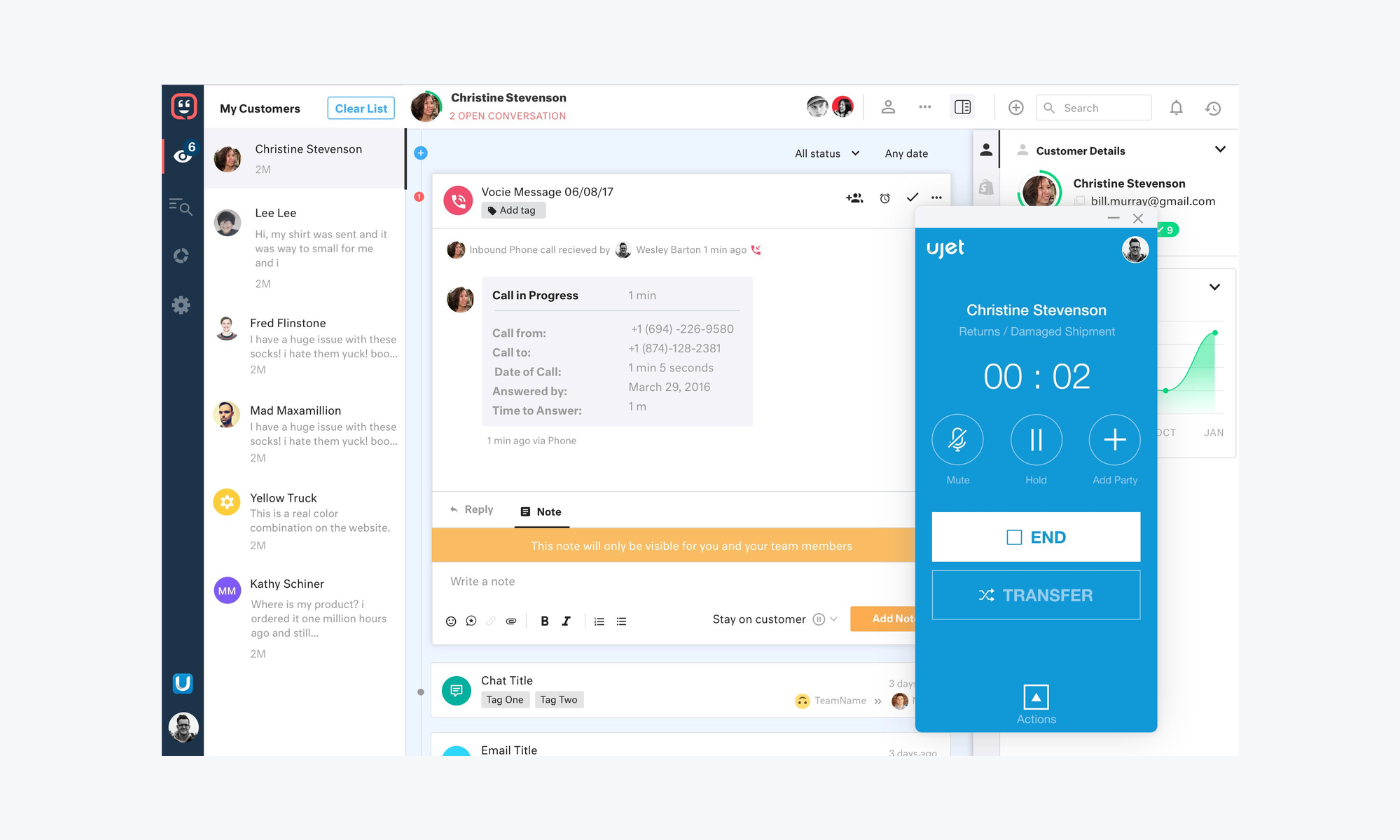
Ratings: 4.4/5 ⭐️ (410+ reviews)
Best for: online shopping stores
Kustomer is a unique CRM designed for high-volume requests that large organizations deal with. The software uses customer data to help businesses anticipate client needs. On top of that, its unified dashboard across all channels helps agents maximize engagement and deliver personalized responses.
Developers can use the platform to build and deploy bot workflows, with simple visual interfaces and built-in templates. Kustomer’s AI assistant identifies keywords and phrases to sort the complex requests and answer frequently asked questions (FAQs).
Pros:
- AI chatbot tool
- CRM tool available
- Variety of integrations
Cons:
- Sometimes gets buggy and crashes
- UI needs improvement
- Enterprise ($89/mo/user)
- Ultimate ($139/mo/user)
16. Happyfox
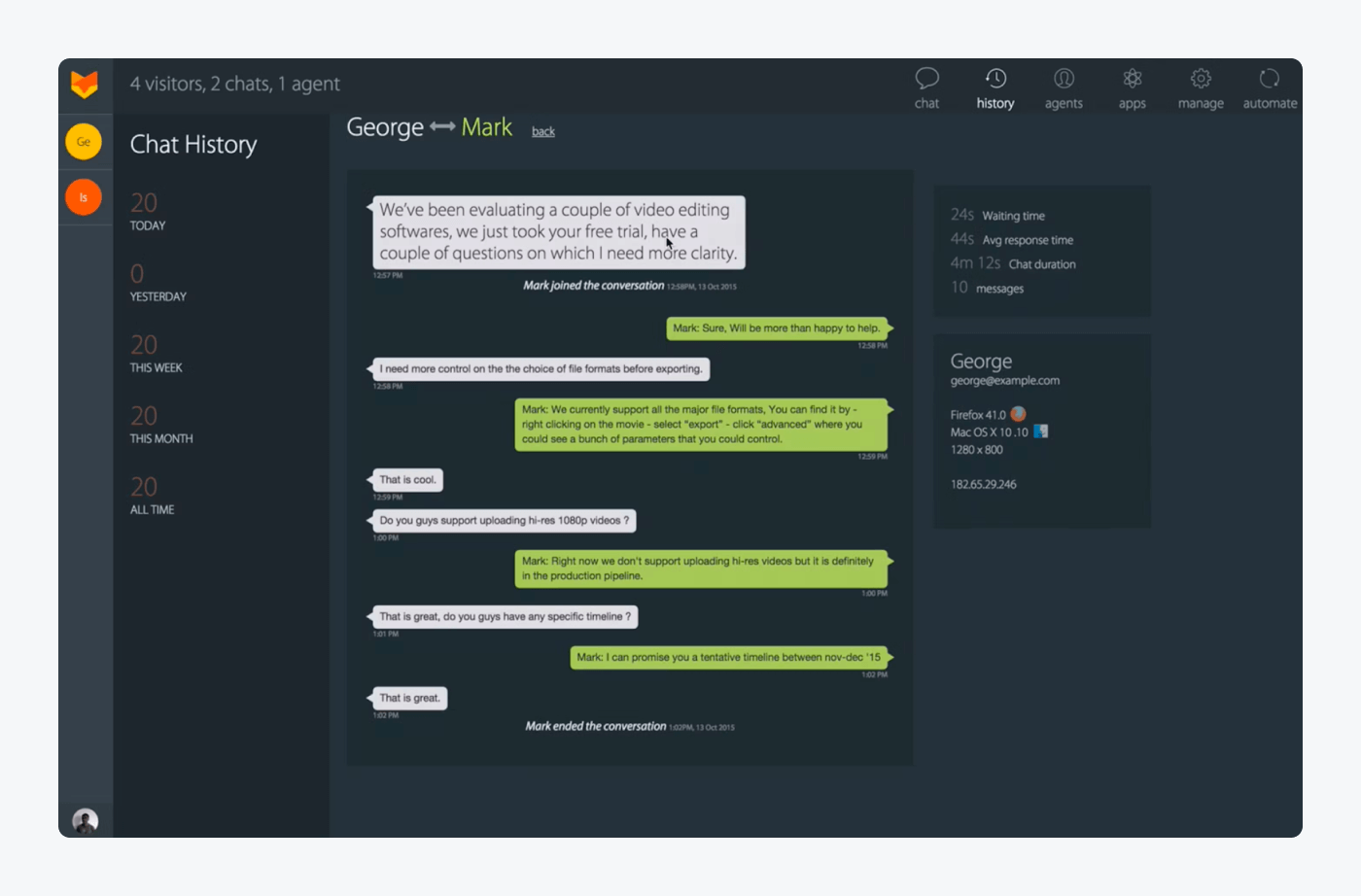
Ratings: 4.5/5⭐️ (120+ reviews)
Best for: medium enterprises
Happyfox is a SaaS help desk solution with robust ticketing software, a knowledge base, and community forums. The system converts all your chat, phone, email, and web requests into tickets and directs them to a single dashboard. The tool can help you analyze support data and interpret it into useful metrics for admins.
The SaaS solution helps in project management by offering Kanban board views, cards, and lists. It also provides multiple shared mailboxes for support teams to collaborate. This is one of the Zendesk knowledge base alternatives that offers a wide range of integrations including Salesforce, Jira, Microsoft Teams, and more.
Pros:
- Canned responses
- Automated smart rules
- Administrative functionality
Cons:
- Customization problems
- Delayed help desk notifications
- Free trial account available for demo
- Mighty ($39/mo/agent)
- Fantastic ($59/mo/agent)
- Enterprise ($79/mo/agent)
- Enterprise Plus ($99/mo/agent)
17. Helpjuice
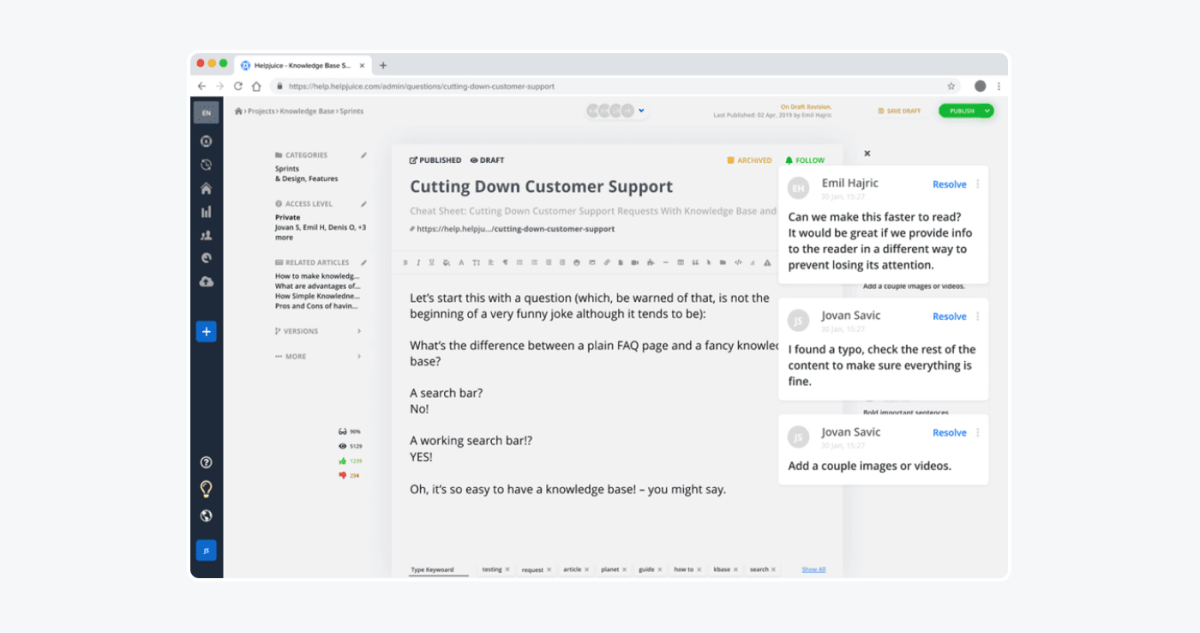
Ratings: 4.5/5 ⭐️ (30+ reviews)
Best for: enterprise companies in the software industries
Helpjuice is a knowledge-base software for businesses offering customer self-service. Managers can view in-platform analytics to see what content is popular with users and how to improve on non-performing material. They can also control who views the content by setting articles to public, internal, or private.
The Helpjuice editor offers unlimited text formatting and allows you to upload and manipulate images. At the same time, you can work on multiple versions of the same article, and switch them, using the editor. On top of that, the support team can comment, mention, and reply to other reps in real-time using the collaboration feature.
Pros:
- Instant Google-like search
- Intelligent analytics
- Multiple integrations
Cons:
- Complex advanced features in the editing tools
- The steep learning curve for new users
- Free 14-day trial available
- Starter ($120/mo)
- Run-Up ($200/mo)
- Premium limited ($289/mo)
- Unlimited users (Contact sales)
18. LiveAgent
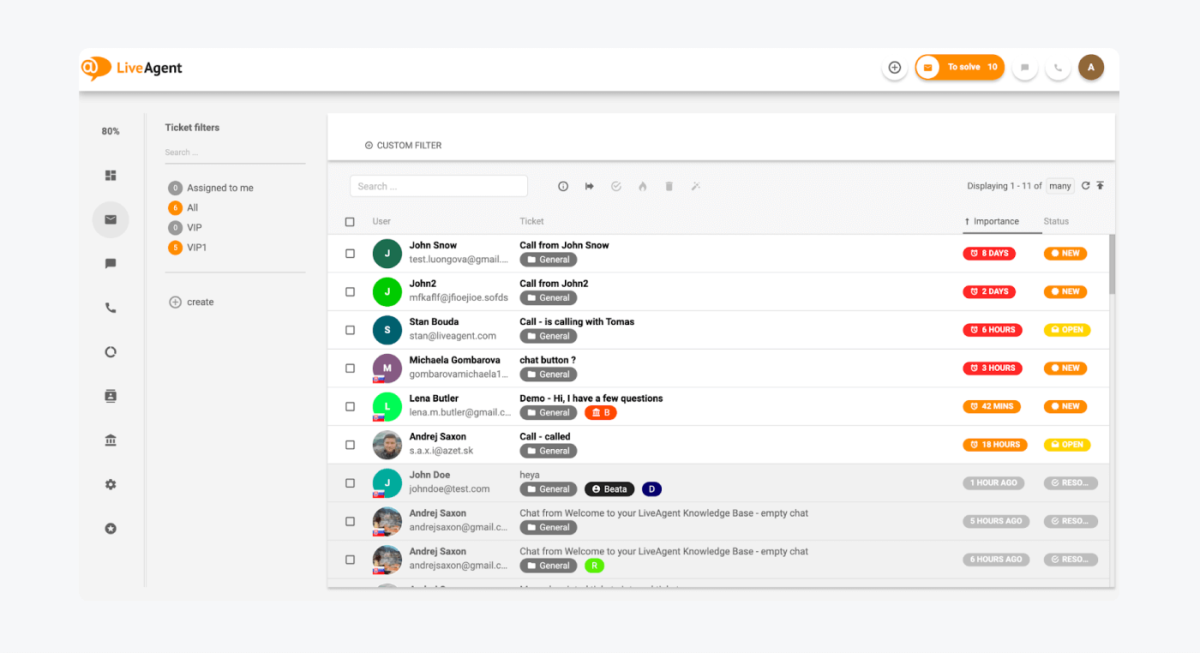
Ratings: 4.5/5 ⭐️ (1,480+ reviews)
Best for: small customer support teams
LiveAgent is a help desk solution that combines multiple channels for support teams. It allows agents to personalize responses and streamlines workflows through its ticketing system. This Zendesk alternative offers a wide array of marketplace integrations for enterprise businesses.
LiveAgent is popular as a leading live chat software and its call center system offers unlimited recordings, IVR, and agent management tools. The ticketing system consolidates all communication channels in one location.
Pros:
- Superior live chat capability
- Ecommerce integrations like Shopify
- Unlimited call recordings at the LiveAgent call center
Cons:
- Limited reporting and customization options
- Lack of note-sharing for agents
- Free 2-month trial available
- Small business ($15/mo/agent)
- Medium business ($35/mo/agent)
- Large business ($59/mo/agent)
- Enterprise ($85/mo/agent)
Right—
But how do you know which platform to choose?
How to choose the right Zendesk competitor for your business?
To choose the right software for your business, you must consider how each option ranks against Zendesk.
Here are some of the things you should keep in mind when choosing the platform for your business:
- Ease of use—ensure the software you pick has a superior interface where agents can view and navigate easily across the dashboard with customer requests
- Customer support—the ideal solution should also provide responsive customer support that will accommodate your business needs and understand your digital environment
- Rich variety of features—choose a support solution with omnichannel capabilities, a plethora of automated workflows, AI functionality, and a shared email for the scalability of your business
- Integrations—the appropriate help desk allows you to integrate several third-party apps, like Shopify, PayPal, and Salesforce service cloud
- Pricing—select a help desk that is affordable across the board with budget-friendly plans and important features
Zendesk alternatives: key takeaway
There are several reasons why your company may decide to go for a Zendesk alternative. Challenges such as difficulty of use, pricing, and support issues may not make it a perfect fit for your organization. Finding a Zendesk alternative that works for your business is the best option.
Here are the Zendesk competitors you can consider:
- Tidio
- HelpCrunch
- Intercom
- Olark
- Drift
- Front
- HubSpot
- Pardot
- LiveChat
- Gorgias
- Freshdesk
- Zoho desk
- Hiver
- Help Scout
- Kustomer
- Happyfox
- Helpjuice
- LiveAgent
Tidio is the best alternative to Zendesk when you consider its intuitive user interface, innovative features, affordable plans, and superior client support. It’s mostly used by small and medium businesses, as well as ecommerce platforms. If you are looking to make the switch, give Tidio a try!
Discover how Tidio can help you grow your business

